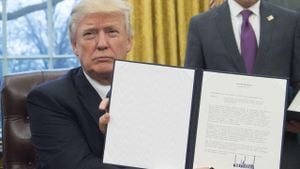A significant spotlight is cast on pressing social issues through France Culture's January 21, 2025, broadcasts, particularly with Linda Bendali’s poignant documentary, "Soumission chimique: pour que la honte change de camp." This powerful film delves deepinto the harrowing experiences of victims subjected to chemical submission, shedding light on the pervasive nature of this troubling phenomenon.
Bendali's documentary, set to air on France 2, features candid interviews with six survivors, who bravely tell their stories, illuminating the often-overlooked effects of chemical submission. This documentary aims to confront the deep-seated stigma surrounding such victims and urges viewers to reconsider their perceptions and responses to these grim realities.
Traditionally, issues of submission, coercion, and societal complicity have been shrouded in silence or taboo. Bendali’s film seeks to dismantle this silence, moving beyond mere exposition to spark meaningful dialogues about consent and awareness about chemical submission. This is especially pertinent as the documentary is released against the backdrop of the disturbing Mazan rape cases, which have put chemical submission under the media’s spotlight, creating a pressing need for societal introspection and reform.
The significance of this documentary is multi-faceted. Firstly, it serves as a historical marker of the changes facing French society, with cultural reflections intertwined with the urgent need for policy change and education around consent. Secondly, it acts as both documentation and testimony; through the voices of actual survivors, the documentary seeks to humanize and give agency back to the often-victimized persona of survivors.
Through this endeavor, France Culture and Bendali aim to not only inform viewers but galvanize them toward empathy and action, confronting cultural biases against victims and encouraging support structures for those affected by such experiences.
Reflecting on contemporary issues related to sexuality, gender, and power dynamics, Bendali's work is timely and thematic, challenging audiences to engage with often unspoken truths and prompting the necessary discourse to push for change. By placing these stories within the framework of France's broader cultural narrative, the documentary contemplates the intersections of historical knowledge and community responsibility.
Airing on France 2, this documentary aligns with the cultural mission of France Culture, which seeks to engage audiences with diverse perspectives and pressing social issues. The interplay between the documentary’s revelations and its cultural contexts echoes loudly, reinforcing the importance of awareness and conversations surrounding chemical submission.
When the documentary airs, it is expected to provoke thought and conversation both on-air and across various platforms. The discomfort it may instill is precisely the motivation behind its creation; maintaining the status quo around societal issues is no longer tenable.
Moving beyond broadcasting, the conversation encourages direct engagement from audiences both digitally and personally. Viewers are not just passive recipients but active participants who are encouraged to think critically about the disturbing realities surrounding chemical submission and those affected by it.
Linda Bendali’s documentary does not shy away from highlighting the emotional turmoil caused by such acts; it presents the narratives surrounding the victims with dignity, emphasizing their courage and resilience. This documentary is set to be more than just visual storytelling; it acts as both lament and call to action, reminding society of its ethical obligation to prioritize victim voices and experiences.
Compellingly, the documentary reflects on the broader societal obligations of awareness, positioning this not merely as individual tragedies but as communal imperatives to rectify injustices. With the airing of this documentary, France Culture aims to set the stage for civic engagement and social change, reminding viewers of their collective responsibility.
Through the artistic lens and factual rigor inherent to France Culture, Bendali’s documentary is positioned to engage audiences, stir emotions, and ignite necessary discussions around the stigma of victims of chemical submission, instilling the urgent desire for transformative action against such societal issues.
Bendali’s endeavor showcases the potential for documentaries to serve as platforms for dialogue and change, effectively blending narrative and fact to provoke thought and action among viewers. The need to address chemical submission remains pressing, and through this documentary, France Culture helps amplify these victim narratives, promoting greater awareness and compassion within society.
Overall, the January 21, 2025, broadcast strategy by France Culture aligns closely with contemporary needs for greater dialogue, cultural critique, and ethical reflection, establishing the show as not only educational but transformative, inviting both media bodies and audiences to take active roles against indifference.



